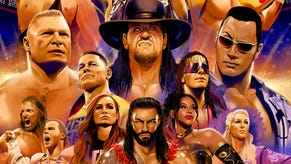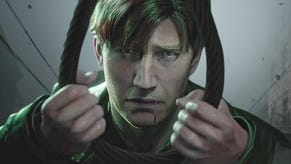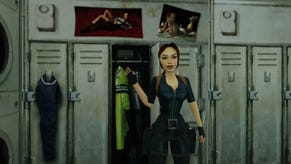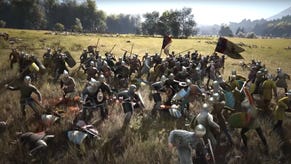A conversation with EA's Peter Moore on the thorny issues of DLC, Online Passes and all the rest of it
"You can pretty much pick out the age of most of your readers by their commentary."

I hate DLC. I hate online passes. I hate EA.
Peter Moore, EA's COO, has read it all before. And he's read it all before right here on Eurogamer. He tells me he reads Eurogamer just before he goes to bed ("Just what I need before I go to bed, but I enjoy it") and keeps a close eye on comments threads, watching them build, watching discussion ebb and flow.
And I've seen it too. I see Eurogamer readers complain when it seems Mass Effect 3 downloadable content should have been on the disc, or an Online Pass locks out content that 10 years ago would have been part and parcel of your £40, or servers for games are shut down only a few years after the're released, or the Euro 2012 downloadable add-on costs £16 despite not offering any gameplay improvements and only having half the official licenses. It's not just EA that comes in for this criticism, but as the biggest game publisher in the world, it has one hell of a target on its back. And half the time, the criticism is justified.
"You can pretty much pick out the age of most of your readers by their commentary," Moore tells me during our Gamescom chat. Moore, in 2012, is second only to John Riccitiello in the EA food chain. I've spoken to him before - many times - as EA Sports chief, as the man running FIFA and Madden and all the other sports games that do so well for the company. But this is the first time I've spoken to Moore the second in command.
With this weight of responsibility on his shoulders, with the stress of having to worry about billions in revenue, millions in profit and loss, about growing digital revenue and console transitions, about free-to-play and high-profile lawsuits against social game behemoths, you'd think Moore would find himself detached from the average gamer on the street, on the internet, on Eurogamer.
Not so.
"I think people are worried gaming is going in a different direction than they were used to with N64, Sega Mega Drive, PlayStation and PlayStation 2," he says. "Everything was dominated by consoles. Pretty much everything was offline. You bought the game. You sat down. And you played the game until you got tired of the game. It was all on the disc. There was nothing else coming along.
Sometimes I feel sorry for gamers whose world was cartridges. I sense on the boards there is a pining for the old times.
"But you're right. I sense that. And sometimes I feel sorry for gamers whose world was cartridges. I sense on the boards there is a pining for the old times."
Gaming changes so quickly. 10 years ago there was no iPhone, no iPad, no Facebook and no Twitter. Now, all these platforms are indispensable tools for the likes of EA to grow digital revenue (some within the company believe digital will account for all revenue within 10 years - Moore isn't so sure). Going back even further, before Xbox Live, there was PlayStation, Nintendo and Sega (Moore's first high-profile gaming gig) and there were discs and cartridges. No DLC. No online passes. Just the disc.
"Games are turning into 365 days a year live operation experiences," Moore says. "And rightly or wrongly we think it's our job to provide reasons every day to go play that game and enjoy that game. Technology is enabling that. Hardware is enabling that. Different game experiences like open world experiences are enabling that, and we're trying to react to what we believe is what gamers want."
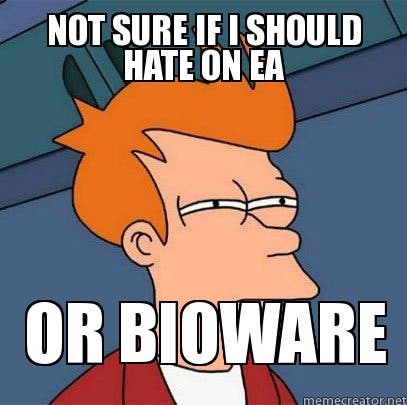
Moore makes the point that for the majority of gamers, having a connected, digital experience is par for the course. "The world is changing. Gaming is changing. And the majority of gamers want the world to change, to keep up," he says. "Maybe it's younger gamers who don't remember a day without the internet. My daughter is 20. She doesn't remember not being connected. And I talk to her about fax machines. I was a teacher in England and we did mimeographs."
Earlier this year EA was voted the worst company in America. It was just after the launch of Mass Effect 3 and the outrage at that ending. It was nearly a year into Origin's life. "We're sure that bank presidents, oil, tobacco and weapons companies are all relieved they weren't on the list this year," EA responded.
"It's well documented that I love to read, particularly on Eurogamer, opinions," Moore says. "And as a company we all do it. And you have to filter constructive criticism from vitriol.
I can filter out hate, vitriol, rants, it's cool to rag on EA, it's cool to rag on Zynga, it's cool to rag on Bobby Kotick, it's cool to rag on Peter Moore.
"I can filter out hate, vitriol, rants, it's cool to rag on EA, it's cool to rag on Zynga, it's cool to rag on Bobby Kotick, it's cool to rag on Peter Moore.
"Particularly on Eurogamer, there are a lot of people... and sometimes I recognise their handles - I've been reading it for years - and they've got great feedback. And we react to that. We listen. Our community managers, almost daily I get reports saying, here's what's trending. And the development side of the house, the marketing side of the house, the publishing side of the house, you read it, filter out hatred that is hatred for hatred's self, and then say, boy, this is what's going on right now in Mass Effect. Then the teams look at it and say, they've got a point. Or, maybe we should think about that.
"Mine is very unscientific. I get home at night. I do my email. I will watch Eurogamer at about 11pm my time and see the new stories post. And then I watch it all build. Just what I need before I go to bed. But I enjoy it.
"Does it hurt? I don't think it hurts when you think it's just founded on rumour. There are no factual relationships for this. And then, it's cool to dislike big corporations without really understanding who the people are. It doesn't hurt me. There's nothing that can be said about me that hasn't been said about me.

"I do get hurt for guys who work at BioWare, who work at DICE, who work at EAC in Vancouver. These are guys who love games and are brilliant at what they do, and then read this stuff and go, well, I gave everything for that, and that's what they think about it."
So, Moore is listening, but it seems unlikely that EA will about turn on the processes and initiatives it has implemented in the last few years because of comments on the internet. As he says, the world is changing. EA moves in the direction dollars are spent. We complain, but we also buy. We're not happy BioWare has made Mass Effect more of a shooter than an RPG, and yet Mass Effect 3 made over $200 million. We're not happy EA releases a new FIFA every year, and yet it's never been more popular. We're not happy EA releases downloadable add-on after downloadable add-on, and yet Battlefield 3 shifted 15 million copies and its DLC drives millions of dollars in revenue. In short, EA is changing because we're changing.
And still, Moore offers an olive branch to those who hate this new way. "Right now I bet you can get FIFA 12 for £20," he says. "And you can, without going online, play for years. You don't need to interact with anybody. You don't need to go online. There are still those great experiences.
"The good news is you can still do that. There are still plenty of great games, we're making them, everyone else is making them, where you buy it for £40 day one, you can play hundreds of hours and you don't have to go online and play. But the vast majority of people do, and are certainly connected. And then if you go multiplayer, I like to think most games that enhances the experience.
"But there are some guys who just want things never to change."


